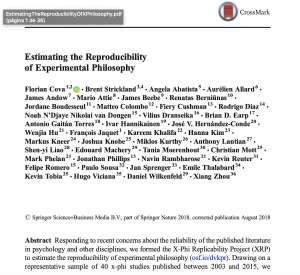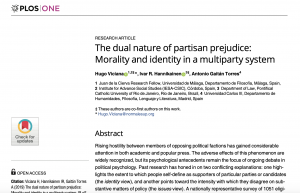
Hi there. I am an Emergia talent attraction research fellow working at the intersection of philosophy and the cognitive and behavioral sciences.
I am currently based at the Departamento de Filosofía, Lógica y Filosofía de la Ciencia, Universidad de Sevilla. Previously I have held research or teaching positions at the University of Paris 1 Panthéon-Sorbonne, the Institute for Advanced Social Studies of the Spanish National Research Council (IESA-CSIC), the Instituto de Filosofia (IFS-CSIC), the Institut de Recherche pour le Développement (IRD-Paris), the Psychology Department of the University of the Balearic Islands, and the University of Malaga. I have also been a visiting researcher at several institutions including the Center for Behavior, Evolution, and Culture at the University of California Los Angeles; the Social Norms group at the Philosophy, Politics, and Economics Program at UPenn; and the Sage School of Philosophy at Cornell University.
You can scroll down and check some of my publications or visit ResearchGate to find preprints of most of them. And here is a list of some previous and current projects on my public profile on Open Science Framework. Feel free to write me a mail [name.surname@gmail] or private message me in Mastodon or Bsky.
Viciana, Hugo; Gaitán, Antonio; Aguiar, Fernando (Ed.)
Experiments in Moral and Political Philosophy Book
Routledge, 2023, ISBN: 9781032293905.
Abstract | Links | BibTeX | Tags: Experimental Philosophy
@book{nokey,
title = {Experiments in Moral and Political Philosophy},
editor = {Hugo Viciana and Antonio Gaitán and Fernando Aguiar },
url = {https://www.routledge.com/Experiments-in-Moral-and-Political-Philosophy/Viciana-Gaitan-Aguiar/p/book/9781032293905},
isbn = {9781032293905},
year = {2023},
date = {2023-08-03},
urldate = {2023-08-03},
publisher = {Routledge},
abstract = {This volume presents new research on the use of experimental methodologies in moral and social philosophy. The contributions reflect the growing plurality of methodologies and strategies for implementing experimental work on morality to new domains, problems, and topics.
Philosophers are exploring the ways in which empirical approaches can transform our idea of the good, our understanding of the social nature of norms and morality, as well as our methods of fulfilling ethical goals. The chapters in this volume extend experimental work on morality to previously underexplored areas. The contributions in Part 1 explore the methods and foundations of experimental work in areas such as folk moral judgments, metaethical beliefs, moral explanations, and reflective equilibrium. Part 2 focuses on issues in normative ethics, legal, and political philosophy such as virtue ethics, utilitarianism, theories of justice, and criminal responsibility. Finally, the chapters in Part 3 tackle various applied ethical issues including feminist X-Phi, animal welfare, experimental bioethics, and self-driving cars.
Experiments in Moral and Political Philosophy will be of interest to scholars and advanced students working in ethics, applied ethics, experimental philosophy, social and political philosophy, and philosophy of law.},
keywords = {Experimental Philosophy},
pubstate = {published},
tppubtype = {book}
}
Philosophers are exploring the ways in which empirical approaches can transform our idea of the good, our understanding of the social nature of norms and morality, as well as our methods of fulfilling ethical goals. The chapters in this volume extend experimental work on morality to previously underexplored areas. The contributions in Part 1 explore the methods and foundations of experimental work in areas such as folk moral judgments, metaethical beliefs, moral explanations, and reflective equilibrium. Part 2 focuses on issues in normative ethics, legal, and political philosophy such as virtue ethics, utilitarianism, theories of justice, and criminal responsibility. Finally, the chapters in Part 3 tackle various applied ethical issues including feminist X-Phi, animal welfare, experimental bioethics, and self-driving cars.
Experiments in Moral and Political Philosophy will be of interest to scholars and advanced students working in ethics, applied ethics, experimental philosophy, social and political philosophy, and philosophy of law.

Cova, Florian; Strickland, Brent; others,
Estimating the reproducibility of experimental philosophy Journal Article
In: Review of Philosophy and Psychology, vol. 12, no. 1, pp. 9–44, 2021.
Abstract | Links | BibTeX | Tags: Experimental Philosophy, Replicability, Reproducibility
@article{cova2021estimating,
title = {Estimating the reproducibility of experimental philosophy},
author = {Florian Cova and Brent Strickland and others},
url = {https://www.researchgate.net/publication/325216701_Estimating_the_Reproducibility_of_Experimental_Philosophy},
year = {2021},
date = {2021-01-01},
urldate = {2021-01-01},
journal = {Review of Philosophy and Psychology},
volume = {12},
number = {1},
pages = {9--44},
publisher = {Springer},
abstract = {Responding to recent concerns about the reliability of the published literature in psychology and other disciplines, we formed the X-Phi Replicability Project (XRP) to estimate the reproducibility of experimental philosophy (osf.io/dvkpr). Drawing on a representative sample of 40 x-phi studies published between 2003 and 2015, we enlisted 20 research teams across 8 countries to conduct a high-quality replication of each study in order to compare the results to the original published findings. We found that x-phi studies – as represented in our sample – successfully replicated about 70% of the time. We discuss possible reasons for this relatively high replication rate in the field of experimental philosophy and offer suggestions for best research practices going forward.},
keywords = {Experimental Philosophy, Replicability, Reproducibility},
pubstate = {published},
tppubtype = {article}
}
Aguiar, Fernando; Gaitán, Antonio; Viciana, Hugo
Una introducción a la ética experimental: Problemas, enfoques y métodos Book
Ediciones Cátedra, 2020.
Abstract | Links | BibTeX | Tags: Cooperation, Dissent and disputes, Effects of teaching ethics, Experimental Philosophy, Fairness, Metaethics, Moral diversity, Philosophy Teaching, Social norms, Utilitarianism
@book{aguiar2020introduccion,
title = {Una introducción a la ética experimental: Problemas, enfoques y métodos},
author = {Fernando Aguiar and Antonio Gaitán and Hugo Viciana},
url = {https://www.catedra.com/primer_capitulo/una-introduccion-a-la-etica-experimental.pdf},
year = {2020},
date = {2020-01-01},
urldate = {2020-01-01},
publisher = {Ediciones Cátedra},
abstract = {En el terreno de la moral, el contraste entre lo que el filósofo Wilfrid Sellars denominó "la imagen manifiesta" y la "imagen científica" es enorme y tiene unas consecuencias prácticas ineludibles. Este libro reduce la distancia entre esa imagen manifiesta y la imagen científica, dotando al lector de referencias fundamentales, enfoques diversos y un amplio abanico de temáticas a partir de investigaciones experimentales sobre nuestra conducta moral.},
keywords = {Cooperation, Dissent and disputes, Effects of teaching ethics, Experimental Philosophy, Fairness, Metaethics, Moral diversity, Philosophy Teaching, Social norms, Utilitarianism},
pubstate = {published},
tppubtype = {book}
}
Viciana, Hugo; Hannikainen, Ivar R; Torres, Antonio Gaitan
The dual nature of partisan prejudice: Morality and identity in a multiparty system Journal Article
In: PloS one, vol. 14, no. 7, pp. e0219509, 2019.
Abstract | Links | BibTeX | Tags: Affective polarization, Experimental Philosophy, Metaethics, Moral absolutism, Outgroup misperception, Partyism
@article{viciana2019dual,
title = {The dual nature of partisan prejudice: Morality and identity in a multiparty system},
author = {Hugo Viciana and Ivar R Hannikainen and Antonio Gaitan Torres},
url = {https://journals.plos.org/plosone/article?id=10.1371/journal.pone.0219509},
year = {2019},
date = {2019-01-01},
urldate = {2019-01-01},
journal = {PloS one},
volume = {14},
number = {7},
pages = {e0219509},
publisher = {Public Library of Science San Francisco, CA USA},
abstract = {Rising hostility between members of opposing political factions has gained considerable attention in both academic and popular press. The adverse effects of this phenomenon are widely recognized, but its psychological antecedents remain the focus of ongoing debate in political psychology. Past research has honed in on two conflicting explanations: one highlights the extent to which people self-define as supporters of particular parties or candidates (the identity view), and another points toward the intensity with which they disagree on substantive matters of policy (the issues view). A nationally representative survey of 1051 eligible Spanish voters yielded support for both explanations. The perceived magnitude and nature of disagreement were associated with increased partisan prejudice, while controlling for partisan identification. Path analyses revealed that issue-based prejudice was more pronounced among ideologically extreme agents (β = 0.237, 95% CI [0.174, 0.300]) than toward extreme targets (β = 0.140, 95% CI [0.078, 0.201]), and replicated recent findings that identity-based prejudice is motivated primarily by non-instrumental factors (β = 0.286, 95% CI [0.230, 0.337]). Together, these results indicate that discrimination across party lines responds to two fundamentally distinct, though at times co-occurring, imperatives: to coalesce in ideologically homogeneous communities, and to protect one’s sense of partisan identity.},
keywords = {Affective polarization, Experimental Philosophy, Metaethics, Moral absolutism, Outgroup misperception, Partyism},
pubstate = {published},
tppubtype = {article}
}
Viciana, Hugo
¿Por qué somos morales? Introducción a la ética naturalista Book
Amazon, Kindle Publishing, 2014.
Abstract | Links | BibTeX | Tags: Cooperation, Emotions, Experimental Philosophy, Machiavellian tit-for-tat, Market for morality, Metaethics, Moral judgment, Moral psychology, Moral wiggle room, Self Deception, Situationism, Status hierarchies
@book{viciana2014queb,
title = {¿Por qué somos morales? Introducción a la ética naturalista},
author = {Hugo Viciana},
url = {https://www.amazon.com/somos-morales-Introducci%C3%B3n-naturalista-Spanish-ebook/dp/B00NPXO398},
year = {2014},
date = {2014-01-01},
urldate = {2014-01-01},
publisher = {Amazon, Kindle Publishing},
abstract = {¿Que tiene que ver la obra de Charles Darwin con la ética? ¿De donde viene nuestro sentido del compromiso moral? ¿Es el altruismo un simple efecto de nuestros genes egoístas? ¿Como informan los nuevos descubrimientos en psicología moral acerca de nuestros comportamientos en los mercados? Estas y otras preguntas son abordadas en ¿Por qué somos morales? Una introducción a la ética naturalista. Escrita en un lenguaje accesible, la obra recopila a lo largo de seis capítulos una gran cantidad de información acerca de los descubrimientos en psicología moral, dinámicas evolutivas y filosofía experimental.},
keywords = {Cooperation, Emotions, Experimental Philosophy, Machiavellian tit-for-tat, Market for morality, Metaethics, Moral judgment, Moral psychology, Moral wiggle room, Self Deception, Situationism, Status hierarchies},
pubstate = {published},
tppubtype = {book}
}



